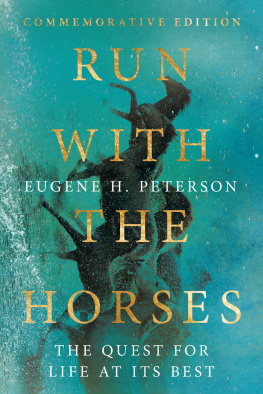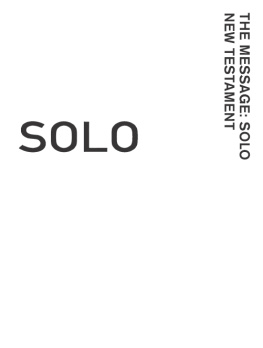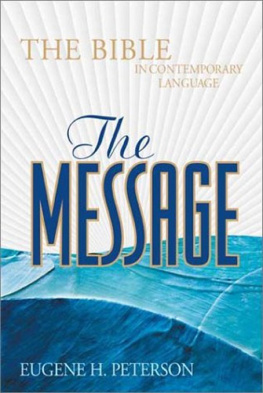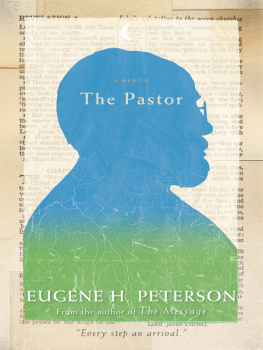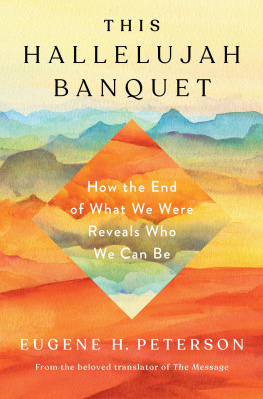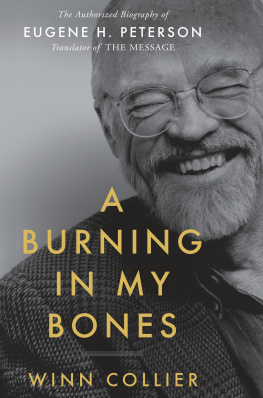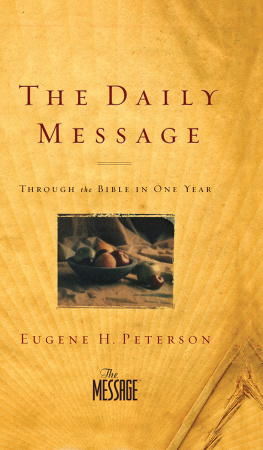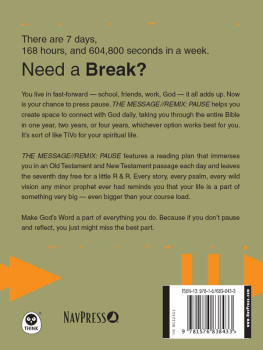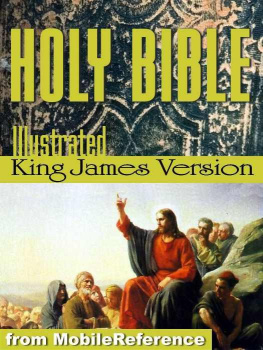The Message: Catholic/Ecumenical Edition is a contemporary rendering of the Bible from the original languages and the New Vulgate, crafted to present its tone, rhythm, events, and ideas in everyday language.

THE MESSAGE: Catholic/Ecumenical Edition The Bible in Contemporary Language
Copyright 2013 by Eugene H. Peterson. All rights reserved.
NavPress, THE MESSAGE and THE MESSAGE logo are registered trademarks of NavPress. Absence of an in connection with marks of NavPress or other parties does not indicate an absence of registration of those marks.
THE MESSAGE text may be quoted in any form (written, visual, electronic, or audio), up to and inclusive of five hundred (500) verses, without express written permission of the publisher, NavPress Publishing Group, providing the verses quoted do not amount to a complete book of the Bible and do not account for 25 percent or more of the total text of the work in which they are quoted.
Notice of copyright must appear as follows on either the title page or the copyright page of the work in which THE MESSAGE is quoted: Scripture taken from THE MESSAGE: CATHOLIC/ECUMENICAL EDITION. Copyright 1993, 1994, 1995, 1996, 2000, 2001, 2002, 2013. Used by permission of NavPress Publishing Group.
When quotations from THE MESSAGE text are used in nonsaleable media, such as church bulletins, orders of service, posters, transparencies, or similar media, a complete copyright notice is not required, but The Message must appear at the end of each quotation.
Permission requests for commercial and noncommercial use that exceed the above guidelines must be directed to and approved in writing by NavPress Publishing Group, Permissions, P.O. Box 35001, Colorado Springs, CO 80935.
THE MESSAGE: CATHOLIC/ECUMENICAL EDITION is licensed to and published by ACTA Publications, 4848 N. Clark Street, Chicago, IL 60640, (800) 397-2282, www.actapublications.com.
Published in association with the literary agency of Alive Communications, Inc., 7680 Goddard St., Suite 200, Colorado Springs, CO 80920, www.alivecom.com.
eBook ISBN 978-0-87946-016-7
Library of Congress Number: 2013935755
Printed in Canada
CONTENTS
Introduction
THE CATHOLIC/ECUMENICAL EDITION
T he first edition of The Message , limited to the New Testament, was published in 1993. The reception was so positive and comments were so affirming that a decision to include the Old Testament resulted in the publication of the full-Bible version of The Message in 2002.
However, almost immediately, Catholic friends, priests, religious and laity, both men and women, began asking me why I hadnt translated the complete Bible, by which they meant the inclusion of the Deuterocanonical writings, books written in the years between the Testaments. Finally, these additional writings, termed Apocrypha by Protestants but recognized by Catholics and people of many other church traditions as part of the divinely inspired Scriptures, are now included in this new Catholic/Ecumenical Edition.
I was not in a position to translate these additional writings myself, but was able to find someone who is eminently qualified to do so. William Griffin is not only an excellent writer and translator who understands exactly what I have tried to do in The Message but also a friend and colleague of many years whom I could trust to carry on my work into this new edition. Bill is a lifelong Catholic with a history of working ecumenically and is especially aware of and sensitive to the various Christian traditions. Included in this edition are:
TOBIT
JUDITH
ESTHER
I MACCABEES
II MACCABEES
WISDOM
SIRACH
BARUCH
DANIEL
These writings are placed in the Bible in the places most Roman Catholics are used to finding them, and Bill Griffin has written the introduction to each of them, including the additional chapters of Daniel that he added to my translation. I am responsible for all the other translations and introductions in the book and have reviewed and approved all of Bills writings.
I am immensely grateful to my many Catholic friends and colleagues for their encouragement to complete The Message . I hope that it will lead to increased ecumenical use and dialogue. I prayerfully anticipate a fresh audience as together we cultivate the fullness of our salvation.
EUGENE H. PETERSON
Introduction
THE ADDITIONAL WRITINGS
I first met Eugene Peterson in the 1980s at a meeting of Christian writers and translators. He was, at the time, pastor of Christ Our King Presbyterian Church in Bel Air, Maryland. He had that quiet magisterial look one associates with an Old Testament prophet. No wonder. He had a masters degree in Semitic languages from Johns Hopkins.
In the 1990s, at another meeting of the same group, Eugene read a couple of psalms hed recently translated from the Hebrew. We expected cool, smooth psalmody; instead, what we heard was rugged verse; closer to the original Hebrew, as he said. We were stunned; it was as if we heard a wailing shofar summoning us back to the Hebrew flock. Which was funny because hed translated them into contemporary language, more American than English.
At these meetings, we all talked endlessly about Bible translation theory. There were two general approaches. The first, more literal translation, was favored by professional biblical scholars; it enabled them to maintain the integrity of their texts and dictated the wording of their translations. The second, more literary or paraphrasal translation, was favored by professional translators like Eugene Peterson and me; we wanted to express the meaning of the text not always found in the wording of literal translation. One would think that both approaches would have much in common; they do, but they dont know how to admit it. The scholars want to be faithful to the original words; we translators want to be faithful to the original meaning. They call for mastery of the biblical languages; we call for mastery of the English language. We both want to get it right.
When Eugene published his complete paraphrasal masterpiece, The Message: The Bible in Contemporary Language, in 2002, it quickly turned into a phenomenal success. As the tenth anniversary approached, the publisher thought it was time to introduce a Catholic/Ecumenical edition; that would mean adding to the Protestant Bible the additional writings familiar to Catholics, Anglicans, Orthodox, and others, variously known as Intertestamentals or Apocrypha or Deuterocanonicals. I expressed interest; the publisher asked for a sample. I translated the Book of Tobit (about 10,000 words). Apparently, I made the cut. Several years and a total of some 130,000 words later, this new edition of The Message has seen the light of day.
For my primary text, I could have used the Hebrew or, where necessary, the Greek manuscripts; but I didnt. As Ive already indicated, they seem to me to be the exclusive possession of the biblical scholars. Instead, I chose the Latin Vulgate not the one put together by Jerome in the fourth century but the revised and expanded edition called Nova Vulgata (New Vulgate) published in 1998.
Pope John Paul II wrote a brief preface to that translation in which he declared and proclaimed that the Nova Vulgata may be used as the authentic text when translating into English, especially in the Sacred Liturgy. And so thats what I used.
Ive done a dozen paraphrasal translations from the Latin of Augustine of Hippo, Thomas Kempis, Nicolas of Cusa. Thomas More and Desiderius Erasmus are in the works. I also write and speak Latin; the latter was improved immensely at the University of Kentucky. And for half a year I ran a program on the Internet named Verbum Diurnum (Latin Word for the Day). Unlike most other Latinists today, I consider Latin not a dead language but a language thats very much alive.
Next page


